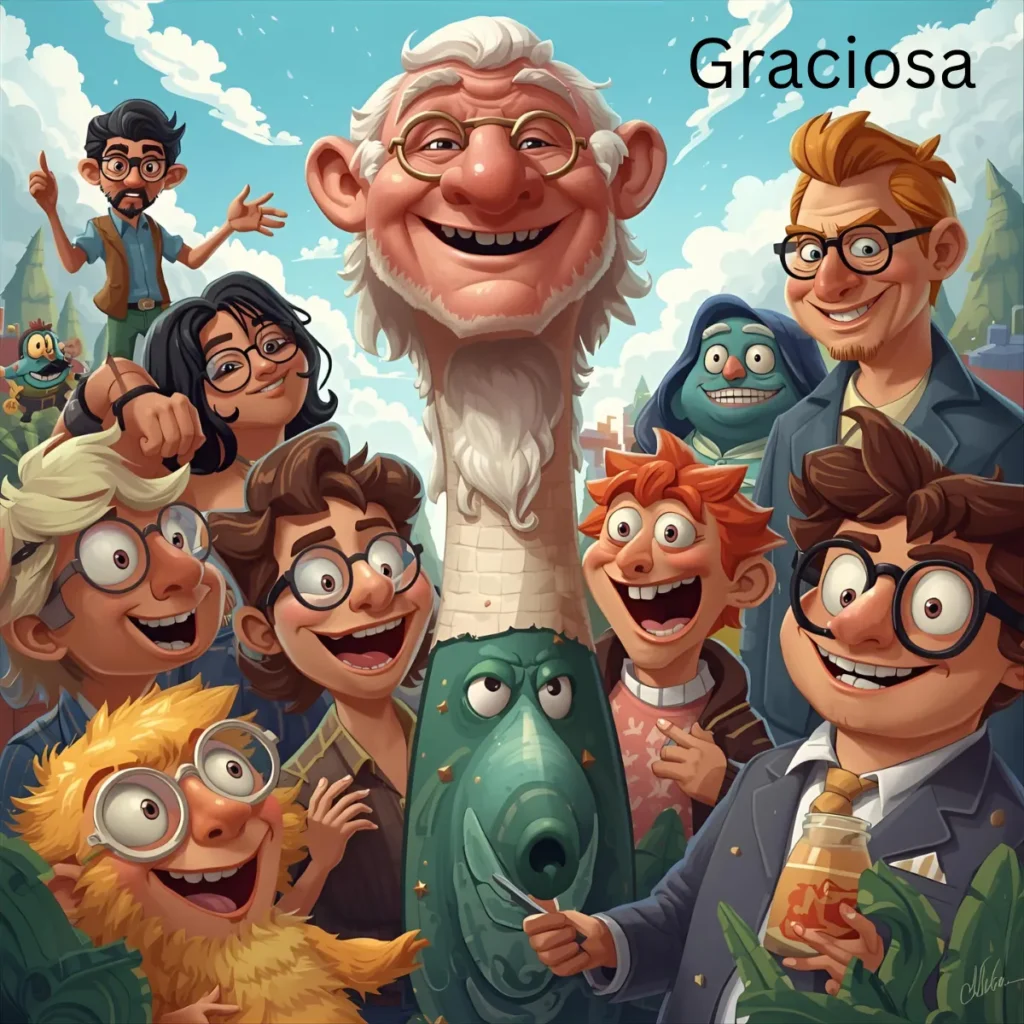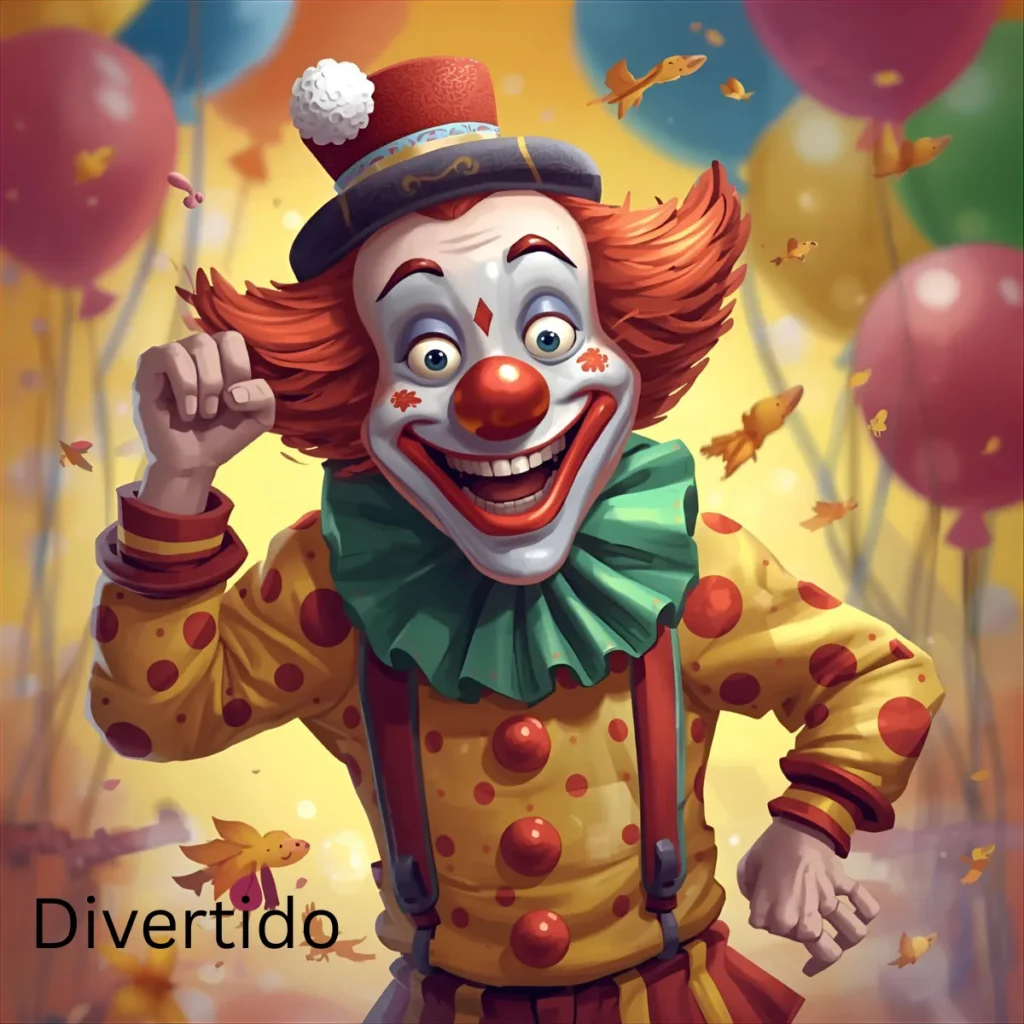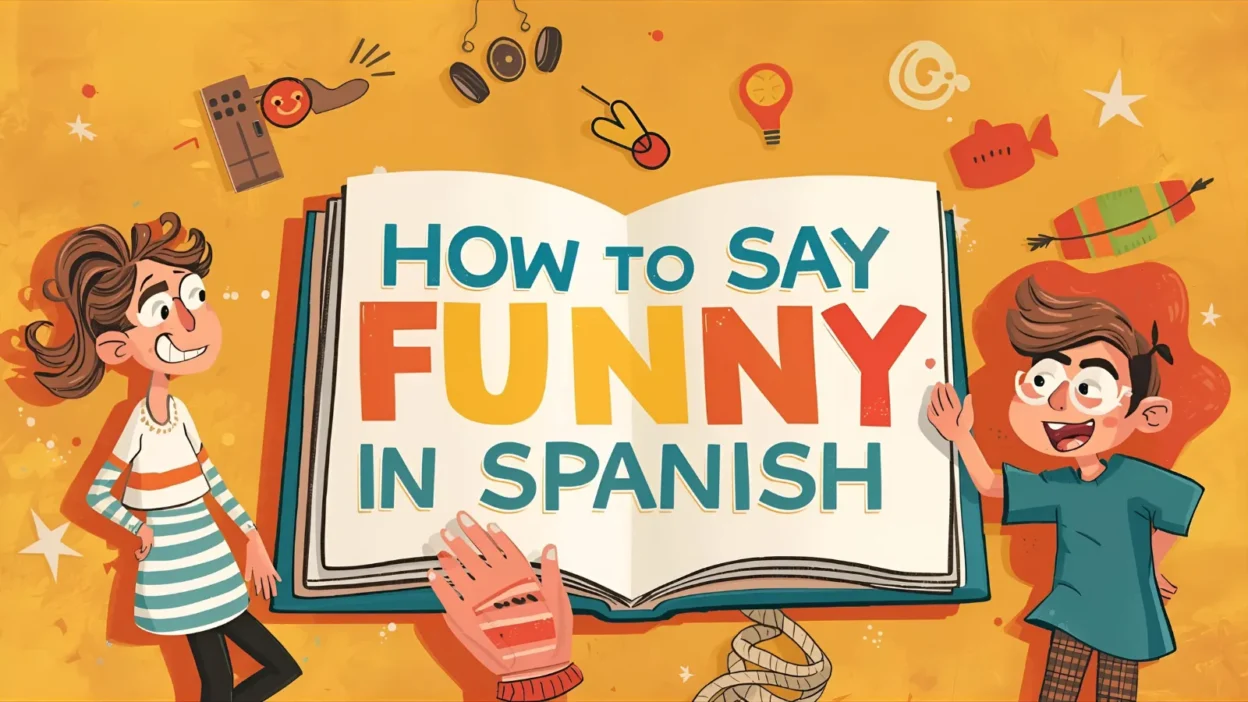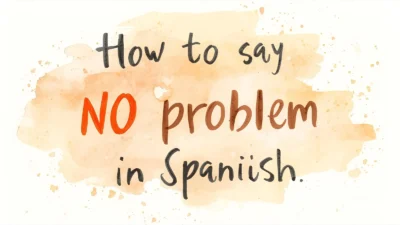Learning how to say funny in Spanish is a fun way to describe humor, jokes, or playful situations in everyday conversation. The most common word is gracioso/a, but depending on context, tone, and whether you’re speaking formally or casually, there are several variations you can use.
Whether you want to compliment someone’s sense of humor or describe a funny event, knowing the right phrase helps you communicate naturally and sound more fluent in Spanish.
Say Funny in Spanish
Here’s a 15-phrases table for different ways to say Funny in Spanish, with English meaning, Spanish phrase, and usage/context:
| # | English Meaning | Spanish Phrase | Usage / Context |
|---|---|---|---|
| 1 | Funny (general) | Gracioso / Graciosa | Standard, common |
| 2 | Hilarious | Hilarante | Formal or literary |
| 3 | Amusing | Divertido / Divertida | Casual, friendly |
| 4 | Comical | Cómico / Cómica | Describing people or events |
| 5 | Entertaining | Entretenido / Entretenida | Events, performances |
| 6 | Witty | Ingenioso / Ingeniosa | Clever humor |
| 7 | Playful | Juguetón / Juguetona | Light-hearted, fun |
| 8 | Goofy | Tonto / Tonta | Informal, humorous teasing |
| 9 | Silly | Bobo / Boba | Friendly teasing, casual |
| 10 | Laughable | Risible | More formal, literary |
| 11 | Cheeky / Mischievous | Travieso / Traviesa | Playful personality |
| 12 | Funny-looking | Gracioso / Graciosa (appearance) | Describing appearance humorously |
| 13 | Entertaining joke | Chistoso / Chistosa | Jokes or funny stories |
| 14 | Ridiculous | Ridículo / Ridícula | Strong humor or exaggeration |
| 15 | Amusingly awkward | Cómico / Cómica (situations) | Awkward but funny moments |
15 ways to say funny in Spanish, complete with examples and the cultural background behind each phrase.
1. Gracioso / Graciosa

Meaning: Funny, witty, amusing
Origin: From gracia (grace), this is the standard Spanish word for “funny” in most countries.
Example:
👤 Usuario A: Ese chico es muy gracioso.
👤 Usuario B: ¡Sí! Siempre me hace reír.
Use: Common in Spain and Latin America for describing someone humorous or entertaining.
2. Chistoso / Chistosa
Meaning: Jokey, funny, always cracking jokes
Origin: Comes from chiste (joke). Often implies someone who tells jokes or acts silly.
Example:
👤 Usuario A: Tu primo es bien chistoso.
👤 Usuario B: ¡Ya sé! Nunca está serio.
Use: Popular in Mexico, Central America, and among kids.
3. Divertido / Divertida

Meaning: Fun, enjoyable, funny in an entertaining way
Origin: From the verb divertir, meaning to entertain or amuse.
Example:
👤 Usuario A: La película fue súper divertida.
👤 Usuario B: ¡Sí! Me reí todo el tiempo.
Use: Broad usage—can mean fun or funny, depending on context.
4. Cómico / Cómica
Meaning: Comical, humorous
Origin: From Latin comicus, meaning related to comedy.
Example:
👤 Usuario A: Ese actor es muy cómico.
👤 Usuario B: ¡Me encanta! Siempre hace papeles graciosos.
Use: Often used for performers or comedy shows.
5. Es un payaso / una payasa
Meaning: she’s a clown (i.e., very silly or goofy)
Origin: Payaso means “clown.” Not always positive—can imply immaturity.
Example:
👤 Usuario A: Pedro siempre hace bromas.
👤 Usuario B: Sí, es un payaso total.
Use: Informal; can be affectionate or critical.
6. Está loco / loca (de risa)

Meaning: shocking funny or just plain unbelievable
Origin: Literally means “they are shocking,” but context adds a humorous tone.
Example:
👤 Usuario A: ¡Esa historia está loca!
👤 Usuario B: Jaja, ¡me morí de la risa!
Use: Used when something is absurd or wildly funny.
7. Hace reír
Meaning: Makes you laugh
Origin: From hacer (to make) and reír (to laugh)
Example:
👤 Usuario A: Me encanta ese comediante.
👤 Usuario B: A mí también. ¡Hace reír mucho!
Use: Describes people or things that provoke laughter.
8. Tiene chispa
Meaning: Witty or sharp sense of humor
Origin: Chispa means spark. Refers to quick-thinking humor.
Example:
👤 Usuario A: Tu hermana tiene mucha chispa.
👤 Usuario B: Sí, siempre sabe qué decir.
Use: Used to describe someone clever or subtly funny.
9. Está para morirse de risa
Meaning: It’s hilarious / “It’ll kill you from laughter”
Origin: Common idiom in Latin America.
Example:
👤 Usuario A: ¿Viste ese video?
👤 Usuario B: ¡Está para morirse de risa!
Use: Used when something is extremely funny.
10. Tiene un sentido del humor único
Meaning: Has a unique sense of humor
Origin: Direct translation of “sense of humor.” Adds nuance.
Example:
👤 Usuario A: ¿Por qué te gusta ese show tan raro?
👤 Usuario B: Tiene un sentido del humor único.
Use: Slightly formal or descriptive.
11. Está de risa
Meaning: It’s laugh-worthy
Origin: Regional expression, especially in Mexico and Colombia.
Example:
👤 Usuario A: Esa situación estuvo de risa.
👤 Usuario B: ¡Totalmente ridícula!
Use: Casual; used for funny situations.
12. Una risa
Meaning: A laugh (used to describe a funny person or situation)
Origin: Noun form used informally in Spain and parts of Latin America.
Example:
👤 Usuario A: ¿Cómo es tu nueva compañera?
👤 Usuario B: ¡Una risa! Te va a encantar.
Use: Informal, friendly tone.
13. Es un personaje
Meaning: she’s a character (i.e., amusing or unique person)
Origin: From personaje (character). Implies colorful personality.
Example:
👤 Usuario A: Conocí a tu abuela…
👤 Usuario B: ¡Es un personaje, verdad?
Use: Describes quirky, funny people.
14. Tiene ocurrencias
Meaning: Says witty or surprising things
Origin: From ocurrir (to occur)—someone who comes up with funny remarks.
Example:
👤 Usuario A: Ese niño tiene cada ocurrencia…
👤 Usuario B: ¡Siempre me hace reír!
Use: Often used for clever or imaginative kids.
15. Es un vacilón (Caribbean Spanish)
Meaning: they are riot / super fun
Origin: From vacilar (to joke, to tease). Common in Cuba, Puerto Rico, DR.
Example:
👤 Usuario A: ¿Y tu primo?
👤 Usuario B: ¡Es un vacilón total!
Use: Regional, lively, and expressive.
FAQs
Q1: What is the most common word for “Funny” in Spanish?
The most common word is “gracioso” (masculine) or “graciosa” (feminine). It means someone or something that makes you laugh.
Q2: Can I use “chistoso” instead of “gracioso”?
Yes, “chistoso / chistosa” also means funny and is commonly used in many Spanish-speaking countries.
Q3: What’s a slang way to say funny in Spanish?
You can say “cómico / cómica” or use casual slang like “es un crack” (meaning someone is super funny or talented).
Q4: How do I say “That’s funny” in Spanish?
You can say “Eso es gracioso” or “Qué gracioso!”
Q5: How do I say “You are funny” in Spanish?
Say “Eres gracioso” (to a boy) or “Eres graciosa” (to a girl).
Q6: Can “divertido” mean funny?
Yes, “divertido / divertida” means fun or amusing and can be used when something is enjoyable and makes you laugh.
Q7: What’s a cute way to say someone is funny?
You can say “Tienes un buen sentido del humor” which means You have a good sense of humor.
Conclusion:
Mastering how to say funny in Spanish lets you describe humor, jokes, and playful moments naturally. From casual chats with friends to more formal conversations, using the right term ensures your compliments and descriptions feel genuine and culturally appropriate.
By knowing different variations, you can match your tone to the situation and connect better with native speakers.



